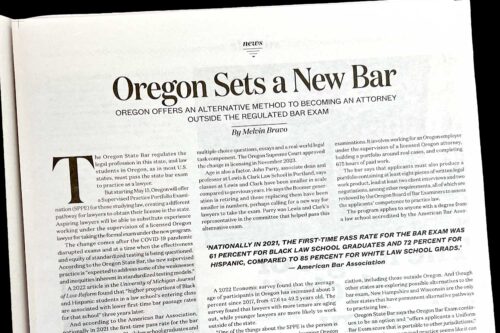
The Oregon State Bar regulates the legal profession in this state, and law students in Oregon, as in most U.S. states, must pass the state bar exam to practice as a lawyer.
But starting May 15, Oregon will offer a Supervised Practice Portfolio Examination (SPPE) for those studying law, creating a different pathway for lawyers to obtain their license in the state. Aspiring lawyers will be able to substitute experience working under the supervision of a licensed Oregon lawyer for taking the formal exam under the new program.
The change comes after the COVID-19 pandemic disrupted exams and at a time when the effectiveness and equity of standardized testing is being questioned. According to the Oregon State Bar, the new supervised practice is “expected to address some of the weaknesses and inequities inherent in standardized testing models.”
A 2022 article in the University of Michigan Journal of Law Reform found that “higher proportions of Black and Hispanic students in a law school’s entering class are associated with lower first-time bar passage rates for that school” three years later.
And according to the American Bar Association, nationally in 2021 the first-time pass rate for the bar exam was 61 percent for Black law school graduates and 72 percent for Hispanic, compared to 85 percent for white law school grads.
Oregon has three law schools: Lewis & Clark Law School, Willamette University College of Law and the University of Oregon School of Law. Each one’s graduates currently take the traditional three-part bar exam of multiple choice questions, essays and a real-world legal task component. The Oregon Supreme Court approved the change in licensing in November 2023.
Age is also a factor. John Parry, associate dean and professor at Lewis & Clark Law School in Portland, says classes at Lewis and Clark have been smaller in scale compared to previous years. He says the Boomer generation is retiring and those replacing them have been smaller in numbers, perhaps calling for a new way for lawyers to take the exam. Parry was Lewis and Clark’s representative in the committee that helped pass this alternative exam.
A 2022 Economic survey found that the average age of participants in Oregon has increased about 3 percent since 2017, from 47.6 to 49.2 years old. The survey found that lawyers with more tenure are aging out, while younger lawyers are more likely to work outside of the state.
“One of the things about the SPPE is the person is going to be practicing law in Oregon, learning Oregon law and applying Oregon law,” Parry says.
According to the Oregon State Bar, SPPE offers applicants a hands-on method in the field, giving them an opportunity and choice outside the standardized bar examinations. It involves working for an Oregon employer under the supervision of a licensed Oregon attorney, building a portfolio around real cases, and completing 675 hours of paid work.
The bar says that applicants must also produce a portfolio containing at least eight pieces of written legal work product, lead at least two client interviews and two negotiations, among other requirements, all of which are reviewed by the Oregon Board of Bar Examiners to assess the applicants’ competence to practice law.
The program applies to anyone with a degree from a law school accredited by the American Bar Association, including those outside Oregon. And though other states are exploring possible alternatives to the bar exam, New Hampshire and Wisconsin are the only other states that have permanent alternative pathways to practicing law.
Oregon State Bar says the Oregon Bar Exam continues to be an option and “offers applicants a Uniform Bar Exam score that is portable to other jurisdictions.”
Parry says that supervised practice seems like it can bring, “a greater degree of confidence that licensing is going to be related to what lawyers do.”